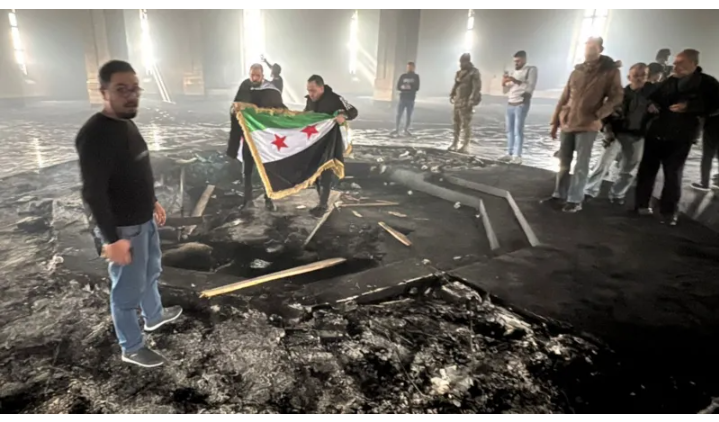Syrian Rebels Burn Tomb of Late President Hafez al-Assad Amid Historic Change.
Syrian rebel forces have destroyed the tomb of Hafez al-Assad, the late father of ousted president Bashar al-Assad, in the Assad family’s hometown of Qardaha in Latakia province. Verified footage shows armed men walking through the burning mausoleum, chanting slogans as the Assad dynasty’s 54-year rule comes to an end.
The rebels, led by the Islamist group Hayat Tahrir al-Sham (HTS), have seized control of major parts of Syria, including the capital Damascus, following a swift offensive. Bashar al-Assad has reportedly fled to Russia, where he and his family have been granted asylum. Statues and posters of both Hafez and Bashar al-Assad have been toppled across the country, with Syrians celebrating the end of an era marked by authoritarian rule.
A New Chapter for Syria
HTS leader Abu Mohammed al-Jolani, now using his real name Ahmed al-Sharaa, has pledged to uphold religious and cultural diversity in Syria. In a meeting with Qardaha elders, HTS and allied factions signed a document emphasising inclusivity, signalling a shift from the Assad regime’s sectarian governance.
Mohammed al-Bashir, head of the transitional government appointed by the rebels, has called for stability and calm. During a meeting in Damascus, he worked with members of Assad’s former cabinet to ensure a smooth transfer of portfolios and institutions.
“We reopened without fear because the people we serve are now not intimidating at all,” said Joud Insani, a chocolate shop worker in Damascus. The capital is seeing signs of normalcy returning, with markets reopening and people resuming daily activities.
Challenges Ahead
Despite the celebrations, the situation remains complex. The United States has pledged support for a new Syrian government, provided it emerges from an inclusive and credible process. However, Iran’s Supreme Leader Ayatollah Ali Khamenei has blamed the Assad regime’s fall on external interference from the US, Israel, and an unnamed neighbouring state.
Meanwhile, Israel has intensified airstrikes on Syrian military targets, citing the need to prevent groups hostile to its security from gaining power. These developments highlight the challenges of ensuring peace and rebuilding a nation torn by years of civil war, during which over half a million people were killed and 12 million displaced.
Hope Amid Ruins
In the devastated neighbourhood of Joubar, emotional reunions are taking place. Monawwar al-Qahef and her husband Muhammad returned to their home for the first time in 12 years, only to find it reduced to rubble. “I feel as if it’s me that has been broken into pieces,” Muhammad said.
While the road to recovery remains long, many Syrians are hopeful for a future without fear or repression, marking the beginning of a new era for their war-torn nation.



